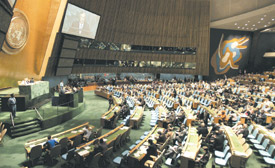|
DAILY NEWS ONLINE |
|
|
|
OTHER EDITIONS |
|
|
|
|
|
|
|
|
|
OTHER LINKS |
|
|
|
|
|
|
  |
UN Convention against Corruption - what it is all aboutDecember 14, 2005 is a significant day in the UN - Sri Lanka relationship for two reasons. First, it was on December 14, 1955 that Sri Lanka was admitted to the United Nations as a member state confirming our status as an independent country under International Law.
Secondly, December 14, 2005, is significant as the date on which the UN Convention Against Corruption (UNCAC) was adopted in 2003, but came into operation after obtaining the requisite 30 ratifications. Sri Lanka is one of the first countries to sign and ratify the (UNCAC) for consolidating our 50 year solidarity with the UN and recognizing that corruption is a problem endemic in this country. As a member of the UN, Sri Lanka could be proud of her relationship with the world body. We have ratified many of the UN conventions relating to human rights, migrant worker rights, international terrorism and rights of children and women. But under our law, mere ratification alone is futile unless supported by corresponding legislation passed in Parliament. In this respect, successive governments hold a very poor record. We show our solidarity with the UN at meetings in New York by signing many international conventions, but forget about them when we disembark at Katunayake. We have to improve on this dismal legislative apathy at least as far as UN Anti-Corruption Convention is concerned. What is UNCAC?United Nations Anti Corruption convention adopted in October 2003, signed by 137 signatory countries is "considered the most comprehensive" anti corruption international instruments. (David Luna) Sri Lanka is one of the earliest countries to sign and ratify UNCAC in early 2004. To date 137 countries have signed the Convention. A few days ago India signed and UN President Bush submitted the proposal for formal ratification by the US Senate. For implementation of the UNCAC, a minimum of 30 countries should not only sign the Convention but a minimum of 30 countries should ratify. The 30 ratifications were completed with Ecuador ratifying the Convention last month. At present out of 137 signatory countries to the UNCAC, 37 have ratified hence the Convention comes into operation on December 14, 2005. UNCAC is the only comprehensive, global effort against corruption, which in the words of the former US Attorney General John Ashcroft, "steals from the needy to enrich the rich" - UNCAC deals with :- (a) Preventive measures (b) Control of election campaign funding. (c) Code of conduct for public servants. (d) Private sector corruption. (e) Stringent auditing and accounting standards. (f) Mobilizing civil society sentinels of corruption. (g) International steps to recover stolen money stashed in foreign banks. (h) Enable countries to recover stolen assets from other countries. 1998 EU Convention Against Corruption makes it a criminal offence to bribe third country officials to win tenders and contracts. 1996 Inter American Convention Against Corruption is another such instrument. What is corruption?UNCAC does not define but includes bribery, money launderings, nepotism, and abuse of power. In short it means abuse of public position for personal gain or those of kith and friends. Should corruption be graded? No. But, some grade corruption as minor (tips and 'santhosams') and grand corruption such as political and multinational cooperate corruption. All corruption is bad, but judicial corruption is considered the worst. It corrodes society and sullies the temples of justice. 2547 years ago, the Buddha condemned judicial corruption in stanza 256 of Dhammapada. That judges should abide by the law and not by benefits. Countries which tolerate corruption as an inevitable fact of life foster a "culture of corruption". For example in Sri Lanka since the open economy in 1978 up to 2005, no major offender of corruption had been found guilty. Private sector is an important partner in corruption as they are the "givers" especially during election campaigns. What are the consequences of corruption? Increased transactions costs and reduced predictability. Costs of corruption are ultimately passed on to the poor consumers. Impedes economic development awarding profitable contrasts to wrong people at wrong prices. Transparency of transactions is suppressed and projects veer toward unsustainable large-scale projects - money goes from projects to pockets. What mechanisms?Commission to Investigate Bribery or Corruption (CIABOC) established in 1994, was ineffective due to beaucratic fighting until recently. According to 2004 report, CIABOC could convict 10 out of 859 complaints mostly from courts administration. Transparency International, Sri Lanka Chapter promotes general awareness on ill-effects of bribery and corruption. CIABOC in Colombo waits for public complaints before taking action but "Sentinels of Corruption" who would be trained lawyers stationed in Legal Aid Centres, in the 1st instance in tsunami affected districts, will spearhead awareness programmes about CIABOC and the UNCAC and advice victims to make complaints safely. Sentinels division of LAC Colombo, will coordinate with CIABOC, Transparency International agencies to promote "Whistle Blower" protection legislation and regulatory reform. LAC laws will promote amendment to CIABOC law in line with UNCAC. |
|
|

